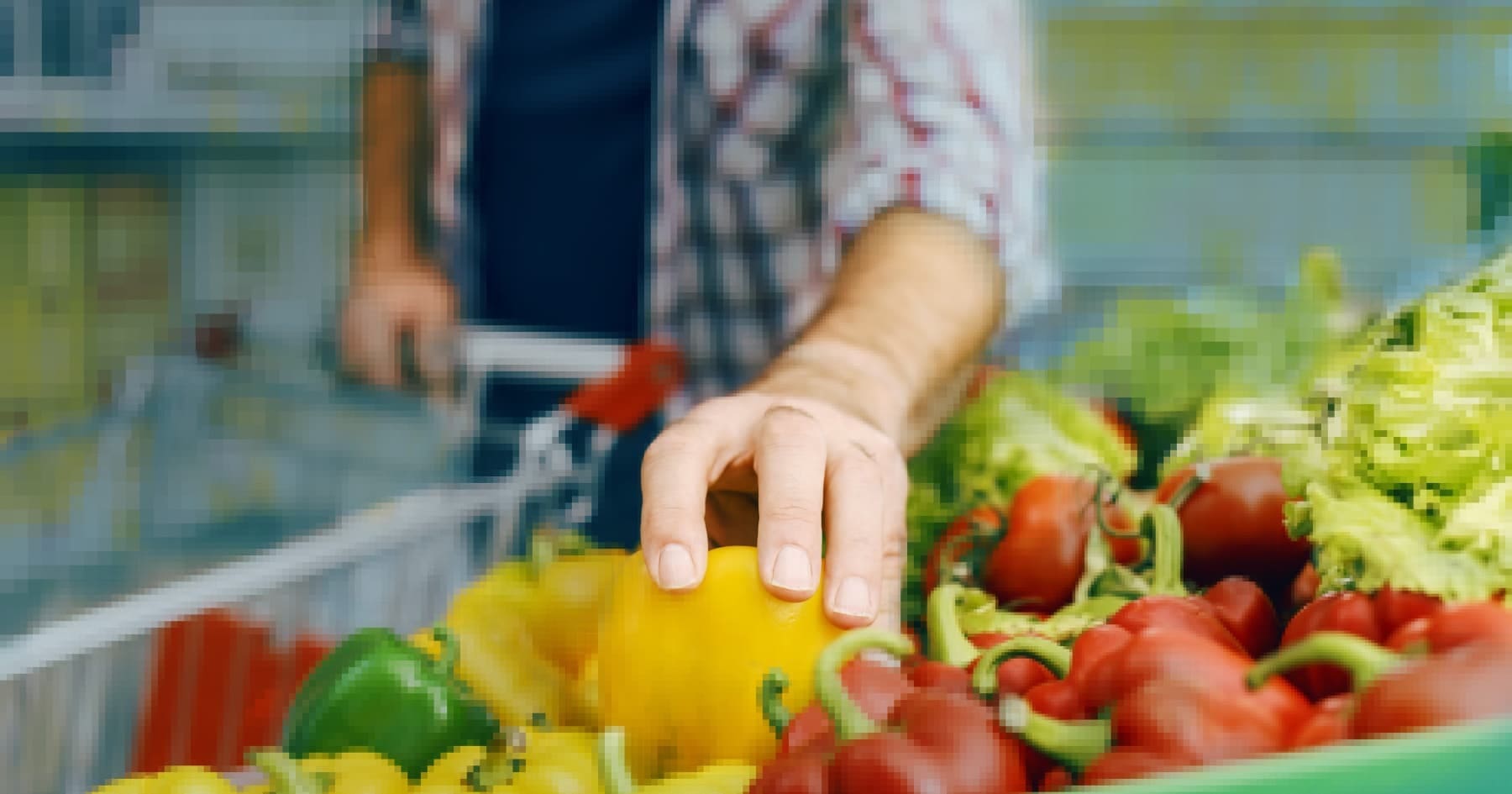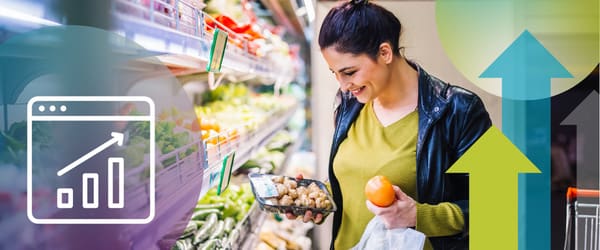
What Stops Grocers From Adopting More Online Grocery Technology?
There’s a paradox occuring in the grocery industry, right now. And not only does it stand to cost grocers significantly in the months to come, it could further impede innovation across the sector.
Despite a clear understanding of the challenges faced by the industry and the availability of effective technological solutions, grocery retailers are hesitant to adopt innovations for their operations.
This hesitancy is highlighted in the 2023 Supermarket Technology Review from Informa and Supermarket News, presented in partnership with Mercatus.
The report, based on feedback from grocery retailers and industry professionals, emphasizes one point of unanimous agreement: technology is not just beneficial but essential for tackling current obstacles and future-proofing the industry. An overwhelming 100% of grocers surveyed acknowledge the role of technology in achieving their primary business goals.
Yet, this enthusiasm contrasts sharply with their lack of action. The study goes on to reveal a cautious, almost reticent approach to investing in necessary technology. It identifies several barriers preventing both large chains and independent grocers from embracing these crucial advancements.
It’s imperative to confront this paradox. Merely acknowledging the challenges and solutions in the grocery industry isn’t enough; it’s time for grocery retailers to decisively act and invest in the technology that will shape the future of the supermarket industry.
Understanding Why Grocery Retailers Are Hesitant
In this blog post, we’re going to examine the hurdles that grocers identified in the research, and connect each one to specific solutions and features of modern grocery technology.
Our aim is twofold:
- To demonstrate how each obstacle can be effectively managed and even turned into an opportunity for growth through the right technology; and
- To demonstrate that the most effective technological solutions are not merely reactive, but are proactively designed with these very challenges in mind.
This approach is not about dismissing the concerns of grocers; rather, it recognizes the validity of their caution. We understand that hesitation in the face of new technology is not just prudent but necessary in an industry filled with rapid changes and uncertainties.
However, by the end of this article, it’s our hope that we’ve not only alleviated the concerns of grocers over investing in increased technology, but also made a convincing case for the prompt implementation of the type of technology that will improve operational efficiencies, increase customer satisfaction, and, as a result, grow your grocery business.
The Challenges Preventing Technology Adoption
Let's begin by looking at the challenges the research identifies as the cause for grocers being reluctant to adopt new technology:
- Associated Costs / Limited Budgets: Financial constraints remain the primary obstacle, especially for smaller grocers who operate with tighter budgets.
- Worries Over Integration of New Technology: The concern about how new technology will mesh with existing systems is a significant barrier.
- Potential Disruption to Operations: Similarly, the fear of disrupting ongoing operations during the transition to new technology is a common concern among grocers.
- Staffing Limitations: The perceived need for additional or specialized staff to manage new technology can be daunting, particularly for grocers with limited human resources.
- Risks of Data Breaches or Data Loss: Apprehensions about potential data breaches or loss when adopting new technology are prevalent.
- Difficulty Scaling Systems With Growth: The challenge of finding technology solutions that can scale effectively with the business growth adds to the reluctance.
- Overwhelming Number of Options: Lastly, the overwhelming number of technological solutions available in the market can make the decision-making process intimidating.
Is Grocery eCommerce Software Technology Affordable?
The most significant barrier to adopting further eGrocery technology according to grocers is cost. More than 60 percent of those surveyed indicate that budget constraints stopped them from building out their technology stack.
Not only does this highlight the need for affordable solutions in the grocery technology space, it also emphasizes the importance of technology that reduces costs through improved operational efficiency and offers immediate methods for offsetting the costs associated with implementing and maintaining grocery eCommerce software.
Operational Efficiency
Going hand-in-hand with concerns over cost, 36 percent of grocers surveyed also identify "operational efficiencies" as their most important consideration when investing in new technologies.
This is where a fully integrated commerce platform can make such a difference. Mercatus, for example, is designed to streamline a grocer’s entire operations, saving valuable time and reducing costs through our:
- Centralized Grocery Order Management system, which gives grocers the ability to access, manage, and track every aspect of order fulfillment, including real-time updates to inventory management.
- Grocery Personalization Engine, which creates a highly personalized automated shopping journey for customers through artificial intelligence that's informed by past purchases, T-Log and adjacent profile data, freeing you from tedious marketing tasks.
- Retailer Console, which tracks user engagement, events, and screens so that you can create custom targeted audiences and gain valuable insights into customer behavior.
- Simplified Order Fulfillment, which allows grocers to fulfill more orders with fewer store associates, leveraging our industry-leading array of integrations.
Managed Cost-to-Serve
While the operational efficiencies provided by an integrated commerce platform save costs over time, the Mercatus platform also offers immediate opportunities to offset the costs of increasing your tech stack.
This is achieved through:
- Retail Media: Mercatus provides you with the opportunity to further monetize your eCommerce traffic by expanding your CPG relationships and capitalizing on the $45 billion retail media industry.
- Fulfillment Cost Management: Mercatus gives you the choice of order fulfillment and last mile integrations so that you can decide on the last mile delivery partners who will optimize both revenue and customer satisfaction.
Meeting Customer Demand Through Online Shopping
But perhaps the most important way in which Mercatus improves the bottom line of grocers is by enhancing customer retention through its grocery eCommerce software.
Other recent research suggests it takes approximately 2.5 to 3.5 new customers to replace the value lost from a single long-term customer leaving. Proven customer retention tactics include:
- Improved pickup and delivery options,
- Leveraging technology for personalization, and
- Enhancing the last mile of the user experience to reduce wait times and improve order accuracy.
Not only does the Mercatus platform make these customer retention tactics possible, it makes doing so easy through our Centralized Grocery Order Management system, Grocery Personalization Engine, and our Simplified Order Fulfillment.
Is It Difficult To Integrate eCommerce Technology Into Your Current Grocery Operations?
The research from the 2023 Supermarket Technology Review identifies worries over tech integration as the second largest hindrance.
40 percent of retailers surveyed express concern over their current operations handling new technology. Just like cost, this apprehension is not unfounded, as integrating new systems can cause all sorts of havoc.
Because Mercatus combines expertise and experience in both the grocery and eCommerce industries, our platform was developed to deliver a smooth transition through flexible APIs. The platform is also built for further customization through a range of pre-built integrations.
Flexible APIs
Our partner network is supported by flexible APIs, developed and managed by a team of dedicated API developers. This approach ensures that our platform can easily integrate with a variety of systems, reducing both the time and cost associated with implementation.
Multi-Tenant SaaS Platform
As a multi-tenant SaaS platform, Mercatus simplifies integration even further. All our integrations are available to every grocery retail client. Through our integration process we aim to minimize potential disruption to your business operations, ensuring a seamless transition to a more technologically advanced, efficient system.
Navigating the Potential for Disruption in Implementing New eGrocery Platforms
Speaking of disruption, 28 percent of the surveyed grocers specifically cite the potential for operational interruptions when integrating new eCommerce technology as a significant concern.
Once again, this is far from an unfounded worry. A grocery store is such an integral part of a community, that disruptions to service or providing an online experience that's less than optimal carries the potential for significant damage to many retailers.
That’s why Mercatus offers further solutions designed to minimize disruptions and allow leading grocers to remain number one in their communities — even as they integrate changes into their operation.
Frictionless Online Grocery Shopping
- Our platform is built to enhance, not hinder, the shopping experience for your customers, ensuring a smooth transition from traditional to digital, or from an existing 1P digital experience.
Proven and Stress-Tested Platform
- Our solutions have been tested extensively by hundreds of thousands of local shoppers, ensuring reliability and stability.
User-Experience Excellence
- The Mercatus platform is not just tried and tested but has been refined based on feedback from a vast user base, ensuring that the transition for both customers and retailers is seamless and intuitive.
Partnering with Mercatus means choosing a path of minimal business interruption and a smooth transition into the digital grocery space.
Addressing Staffing Challenges for an Online Grocery Business
Another significant concern for retailers, especially independents, is the staffing requirement for managing eGrocery processes. 35 percent of retailers cite the lack of staff as a major hurdle, a concern that escalates to 50 percent among independent grocers.
This issue highlights the challenge of transforming general staff into skilled personnel capable of handling sophisticated technology, a task that can seem overwhelming for smaller operations.
Mercatus addresses this challenge through:
User-Friendly Software
Recognizing the importance of ease of use and accessibility, our platform features an easy-to-use CMS and admin interface, designed to reduce the learning curve and make technology management feasible for all staff levels.
Ongoing Support
Beyond the intuitive design of our software, Mercatus excels in offering responsive in-house support and implementation.
- From the very first day, our team is actively involved, providing hands-on, results-oriented onboarding and implementation.
- This approach ensures that even retailers with limited staff can smoothly integrate and manage our eGrocery technology.
Being a Full-Time Partner
Mercatus's role extends beyond that of a mere software solution provider; we view ourselves as a committed partner to grocers.
- We understand the nuances and constraints of the grocery sector.
- Our dedicated support system is designed to be a reliable extension of your team, assuring that every step of adopting and managing eGrocery technology is well-supported and aligned with your business needs.
Mitigating Data Security Risks with Mercatus
Another of the significant hurdles that the research from Supermarket News identifies is a concern over data security. Approximately 22 percent of grocers highlighted the risk of data breaches as a major deterrent.
When we consider the impact of data security risks, it only serves to emphasize the crucial role of customer loyalty and experience in a successful grocery operation. This factor was identified as the second-most important consideration in technology adoption (behind operational efficiencies), and it's exactly why Mercatus has positioned its platform to prioritize privacy and security.
CloudFare Security and Privacy:
- Mercatus protects your data and the quality of your customer's experience with our CloudFlare security. This best-in-class security infrastructure ensures privacy and data security for grocers and customers alike.
Enterprise-Secured Architecture:
- As previously mentioned, Mercatus is a multi-tenant SaaS model with an API-based enterprise-secured architecture. This ensures that while grocers enhance their customer experience, they do so without compromising on data security.
Scaling Your Business with eGrocery Technology

A small, but notable, 12 percent of retailers surveyed express concerns about the scalability of eGrocery technology, viewing it as a barrier to investing in tech solutions. In some sense, this is a good problem to have, as it identifies that grocers aren't merely looking for quick fixes, but instead, long-term solutions that can grow with a grocery business.
The Mercatus platform is designed to be a scalable solution that not only meets your current needs but also promotes and supports the growth of your business.
More Stores and More Customers
- Whether you're operating 20 or 200 stores, the Mercatus platform is built to handle increased users and transactions effortlessly, guaranteeing a 99.9% application uptime.
The Mercatus approach to scalability is comprehensive, going beyond having a platform capable of handling hundreds of stores and tens of thousands of users. It’s an agile solution that includes customizations to meet the needs of all grocers.
Built for Flexibility
- Again, we come back to the seamless integrations that Mercatus provides with its range of last-mile delivery partners, enabling you to scale your order fulfillment strategy efficiently. This flexibility ensures that as your business grows, your ability to meet customer demands grows with it.
Which eGrocery Technology Option Is Best?
While only a small percentage of retailers (9 percent) feel overwhelmed by the many eGrocery technology options available, the challenge of choosing the right technology remains significant.
By examining all the other obstacles in the path to greater tech adoption, and how Mercatus removes each obstacle through the thoughtful development of all its versatile solutions, Mercatus emerges as more than just as another option.
Our suite of solutions stands out for its cost-effectiveness, ease of integration, intuitive interface, security and ability to scale. Mercatus has not only been designed to clear every hurdle a grocer might have in their path, but to turn many of those hurdles into competitive advantages for regional grocers.
Embrace the Future with Mercatus
It's thrilling to learn from the Supermarket News research that grocers are overwhelmingly excited about the implementation of technology throughout their businesses.
Mercatus stands ready as a grocer's strategic partner, not just in implementing the technology we're all excited about, but in transforming eGrocery into a profitable and customer-centric venture. Our platform is designed to streamline your operations, enhance customer experience, and elevate profitability, all while being tailored to the unique requirements of your business.
Don’t let the challenges hold you back. Join the many successful retailers who have already embraced Mercatus to navigate these hurdles.
You know the challenges. You know the solutions to those challenges. The time for action is now.
Start your journey towards a more profitable eGrocery future with Mercatus by scheduling a tour of our platform with a grocery eCommerce expert.
 Newsroom
Newsroom
